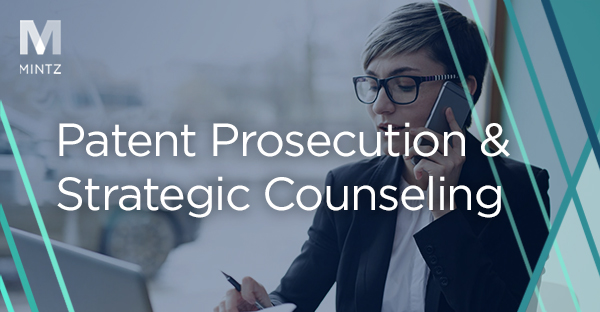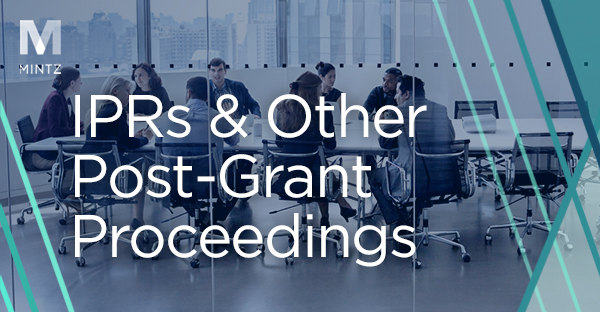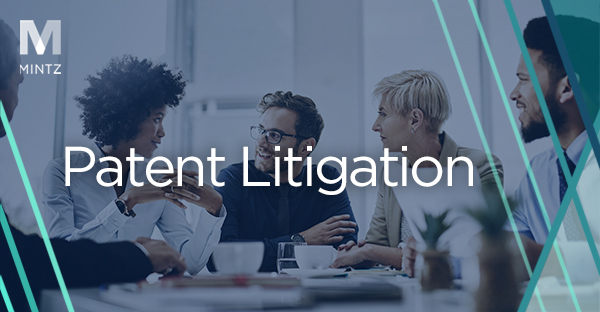
Intellectual Property
Viewpoints
Filter by:
Quentin Tarantino’s Secret NFTs
December 8, 2021 | Blog | By Michael Graif , Frank Gerratana
Quentin Tarantino recently announced plans to auction off seven scenes from the 1994 motion picture Pulp Fiction as non-fungible tokens or NFTs. These “Tarantino NFTs” will include a collection of high-resolution digital scans of the original handwritten Pulp Fiction screenplay. The NFTs each contain scans of the uncut screenplay pages themselves that form a single scene from the movie. They will be auctioned on the NFT marketplace OpenSea and are built on the blockchain platform Secret Network, which launched in February 2020.
Read more
PATENT 101: Key Considerations and Activities for Establishing a Patent Program (Part 2 of 3)
December 1, 2021 | Blog | By Michael Van Loy, Kevin Amendt, Nicholas Eadie
Tasked with starting an innovation protection and patent development program at your company but do not know where to begin? This three part series describes the key components to a patent development program for any company, small or large. This second installment in the series describes subject matter for educating the innovator technical team tasked with developing or evaluating potential patentable innovations within a company.
Read more
Who’s in Charge Here? Federal Circuit Says An Arbitrator, not District Court, Should Decide Arbitrability
November 22, 2021 | Blog | By Matthew Hurley, Oliver Ennis
In "ROHM Semiconductor USA, LLC v. MaxPower Semiconductor, Inc.", th Federal Circuit held that an arbitrator, not a federal district court, should decide whether a dispute arising from a technology license is subject to mandatory arbitration. Agreeing with a long line of decisions from other circuits, the Federal Circuit found that where an agreement incorporates by reference rules allowing an arbitrator to determine arbitrability, those rules should be given effect and an arbitrator, not a court, should decide whether the dispute is subject to arbitration.
Read more
Discretion Retained: USPTO Dodges Attack from Big Tech to Rein in Discretionary IPR Denials
November 22, 2021 | Blog | By Michael McNamara, Daniel Weinger
The U.S. Patent and Trademark Office (USPTO) recently thwarted an attempt by big tech companies such as Apple, Cisco, Google, and Intel, to rid themselves of discretionary denials under the Fintiv factors. While these companies will almost assuredly seek other avenues to dismantle such discretionary denials, last week’s developments are a win for patent owners in the short term.
Read more
Examining Art Units to Avoid Subject Matter Eligibility Challenges for Bioinformatics and AI-related Patents
November 18, 2021 | Blog | By Terri Shieh-Newton, Mark Hammond
Computer-based inventions – especially in the machine learning (ML), bioinformatics, and artificial intelligence (AI) fields – are susceptible to subject matter eligibility challenges. Subject matter eligibility challenges may prevent a patent application from being granted by the United States Patent and Trademark Office (USPTO) and may even be asserted to invalidate a patent post-grant. In recent years, the Federal Circuit has implemented a multi-step test to determine whether patent claims would survive a subject matter eligibility challenge.
Read more
Federal Circuit Affirms Dismissal of Hatch-Waxman Defendants for Lack of Venue and Failure to State a Claim
November 12, 2021 | Blog | By Adam Samansky, Peter Cuomo, Joe Rutkowski
On November 5, 2021, the U.S. Court of Appeals for the Federal Circuit in Celgene Corp. v. Mylan Pharmaceuticals Inc., Case No. 21-1154, affirmed a decision from the District Court of New Jersey dismissing a suit brought by Celgene Corporation (“Celgene”) under Rule 12(b)(6) for improper venue as to defendants Mylan Pharmaceuticals Inc. (“MPI”) and Mylan Inc. and for the failure to state a claim against defendant Mylan N.V. Celgene had brought suit after MPI submitted an ANDA seeking approval to market a generic version of the drug Pomalyst used to treat multiple myeloma. In assessing venue, the court held that it was MPI’s ANDA submission to the U.S. Food and Drug Administration (“FDA”), and not the sending of a notice letter to Celgene in New Jersey, that was the artificial act of infringement pursuant to the Hatch-Waxman Act. The district court thus held, and the Federal Circuit affirmed, that venue in New Jersey was improper.
Read more
Apple Backs Down: Commits to Take Global FRAND License to Avoid Exile from UK Market
November 5, 2021 | Blog | By Michael Renaud, James Wodarski, Matthew Galica
The Patentability of Blockchain and Cryptocurrency
November 5, 2021 | Video | By Frank Gerratana
Frank Gerratana discusses the relationship between blockchain and cryptocurrency and the underlying intellectual property issues and opportunities for patent holders.
Read more
Federal Circuit Clarifies that Willful Infringement Does Not Require Egregious Conduct
October 26, 2021 | Blog | By Adam Samansky, Peter Cuomo, Joe Rutkowski
On September 28, 2021, in a precedential opinion, the United States Court of Appeals for the Federal Circuit, in SRI Int’l, Inc. v. Cisco Systems, Inc., Nos. 2020-1685, -1704, clarified its decision from a prior appeal in the same case to hold that a finding of willful infringement requires only deliberate or intentional infringement, not egregious, wanton, malicious, or bad-faith infringement conduct.
Read more
Patent Owner Tip #19 for Surviving an Instituted IPR: Sur-Reply Strategies
October 25, 2021 | Blog | By Brad M Scheller , Courtney Herndon
In this final patent owner tip for surviving an instituted IPR we discuss sur-reply strategies. At this point, the Patent Owner has filed its Response, developed all the facts and evidence, and taken and defended expert depositions.
Read more
EXCLUSIVE RIGHTS: Intellectual Property — Don’t Get Caught Double Patenting!
October 21, 2021 | Podcast | By Alex Trimble, PhD
In this episode of the EXCLUSIVE RIGHTS: Intellectual Property podcast, Mintz patent attorneys Lily Zhang and Alex Trimble, PhD, discuss double patenting, a complicated and sometimes confounding area of patent law.
Read more
Invalidity of Terminal Patents Not Tied to Disclaimed Patent-in-Suit’s Expiration
October 6, 2021 | Blog | By Andrew DeVoogd, Courtney Herndon
In an interesting recent case of first impression, Judge Albright in the Western District of Texas denied a motion for judgement on the pleadings filed by Defendants Google and YouTube because the asserted patent was terminally disclaimed to two other patents that had been invalidated prior to its issuance. In VideoShare, LLC v. Google, LLC, 6:19-cv-663 (W.D. Tex. Sept. 29, 2021) (Albright, J.), the Court rejected the argument that the invalidation of the terminal patents was the “expiration” of the terminal patents, and that the asserted U.S. Patent No. 10,362,341 (“the ’341 patent”) was therefore also necessarily expired because it allegedly shares the expiration date of the terminal patents. Judge Albright concluded that, to the contrary, the prior finding of invalidity of the terminal patents had no impact on the expiry of the terminally-disclaimed ’341 patent.
Read more
Optis Puts Apple’s Feet to the UK Fire: Commit to FRAND or Be Snuffed Out
October 4, 2021 | Blog | By Michael Renaud, Daniel Weinger, James Thomson
Recent developments indicate that the UK is a favorable jurisdiction that owners of standard essential patents (“SEP”) can leverage to obtain appropriate SEP rates from what would otherwise be unwilling licensees. Demonstrating the point, a recent order from Justice Meade of the High Court in the sprawling Pan Optis/Unwired Planet SEP dispute with Apple provides an outline to the UK’s approach to handling SEP implementers who are unwilling to commit to court-determined FRAND licenses.
Read more
PTAB “Overlooks” Rehearing Consequences and Swings the Rehearing Door Wide Open
October 1, 2021 | Blog | By Daniel Weinger, William Meunier , Sean Casey
A recent decision by a Patent Trial and Appeal Board (PTAB) panel in Canadian Solar Inc., et al v. The Solaria Corporation may have opened the door for aggrieved parties to seek rehearing for any reason, rather than the prescribed situation where the panel “misapprehended or overlooked” some issue in an inter partes review (IPR).
Read more
Custom Servers Pin Netflix In the Eastern District of Texas
September 30, 2021 | Blog | By Daniel Weinger, Jessica Perry
Patent owners searching for an appropriate venue for cases against alleged infringers may be able to point to the activity of an infringer’s agents, based on a new decision from the Eastern District of Texas. In recommending denial of a Netflix motion to dismiss, Magistrate Judge Payne explained that the nature and extent of Netflix’s relationship with internet service providers (“ISPs”) within the district gives rise to proper venue as a regular and established place of business of Netflix.
Read more
Patent Owner Tip #18 for Surviving an Instituted IPR: Defending Depositions
September 23, 2021 | Blog | By Michael Newman, Sean Casey
In our penultimate patent owner tip for surviving an instituted IPR, we turn our discussion to defending the deposition of your expert. At this stage of the proceeding, your Patent Owner Response has been filed, and all the facts and arguments you need have already been developed, including any necessary expert testimony.
Read more
When It Isn’t Better Late Than Never: ALJ Reins in on Redesigns First Disclosed in the Last Week of Fact Discovery
September 21, 2021 | Blog | By Michael Renaud, Adam Rizk, Matthew Karambelas, Tianyi Tan
In a recent IAM article, Levelling the playing field in ITC patent cases by identifying redesigns to a set deadline, we commented on best practices for ITC complainants to protect their interests against the nascent uptick of redesign submissions at the tail end of fact discovery. Although reasonable minds can differ as to whether the uptick in motion practice is coincidence or a more troubling sign that some respondents are using late redesign disclosures as a vehicle to put complainants at a disadvantage in fast-paced Section 337 proceedings, such late disclosures undoubtedly prejudice complainants’ ability to fully review and assess such disclosures for possible infringement.
Read more
N.D. Ill. Finds that a Foreign Parent Corp. May be Sued Under BPCIA Without the U.S. Subsidiary that Signed and Filed aBLA
September 21, 2021 | Blog | By Thomas Wintner, Adam Samansky, Joe Rutkowski
In what appears to be a case of first impression, on August 23, 2021 U.S. District Judge John Z. Lee of the United States District Court for the Northern District of Illinois denied a biosimilar applicant’s motion to dismiss a patent infringement suit brought under the Biosimilar Price Competition and Innovation Act (“BPCIA”) against a foreign parent corporation that did not file or sign the relevant abbreviated Biologics License Application (“aBLA”).
Read more
Genus Claims: Foiled again by Written Description
September 16, 2021 | Blog | By Thomas Wintner
In late August of 2021, the Federal Circuit reversed a jury verdict of $1.2 billion in favor of Juno Therapeutics and Sloan Kettering Institute because the jury’s finding that four of the asserted patent claims did not lack adequate written description under 35 U.S.C. § 112 was not supported by substantial evidence.
Read more
Explore Other Viewpoints:
- Data Centers & Digital Infrastructure
- AI: The Washington Report
- Antitrust and Federal Regulation
- Appellate
- Arbitration, Mediation & Alternate Dispute Resolution
- Artificial Intelligence
- Awards
- Bankruptcy & Restructuring
- California Land Use
- Cannabis
- Class Action
- Complex Commercial Litigation
- Construction
- Consumer Product Safety
- Corporate Governance (ESG)
- Cross-Border Asset Recovery
- DEI Legal Developments
- Debt Financing
- Direct Investing (M&A)
- Diversity
- EB-5 Financing
- Education & Nonprofits
- Employment
- EnforceMintz
- Environmental (ESG)
- Environmental Enforcement Defense
- Environmental Law
- Environmental, Social, and Corporate Governance (ESG)
- FDA Regulatory
- False Claims Act
- Federal Circuit Appeals
- Financial Institution Litigation
- Government Law
- Growth Equity
- Health Care
- Health Care Compliance, Fraud and Abuse, & Regulatory Counseling
- Health Care Enforcement & Investigations
- Health Care Transactions
- Health Information Privacy & Security
- IP Due Diligence
- IPRs & Other Post Grant Proceedings
- Immigration
- Impacts of a New US Administration
- Insolvency & Creditor Rights Litigation
- Institutional Investor Class Action Recovery
- Insurance & Financial Services
- Insurance Consulting & Risk Management
- Insurance and Reinsurance Problem-Solving & Dispute Resolution
- Intellectual Property
- Investment Funds
- Israel
- Licensing & Technology Transactions
- Life Sciences
- Litigation & Investigations
- M&A Litigation
- ML Strategies
- Managed Care
- Medicare, Medicaid and Commercial Coverage & Reimbursement
- Mergers & Acquisitions
- Patent Litigation
- Patent Prosecution & Strategic Counseling
- Pharmacy Benefits and PBM Contracting
- Portfolio Companies
- Privacy & Cybersecurity
- Private Client
- Private Equity
- Pro Bono
- Probate & Fiduciary Litigation
- Products Liability & Complex Tort
- Projects & Infrastructure
- Public Finance
- Real Estate Litigation
- Real Estate Transactions
- Real Estate, Construction & Infrastructure
- Retail & Consumer Products
- Securities & Capital Markets
- Securities Litigation
- Social (ESG)
- Special Purpose Acquisition Company (SPACs)
- Sports & Entertainment
- State Attorneys General
- Strategic IP Monetization & Licensing
- Sustainable Energy & Infrastructure
- Tax
- Technology
- Technology, Communications & Media
- Technology, Communications & Media Litigation
- Trade Secrets
- Trademark & Copyright
- Trademark Litigation
- Unified Patent Court (UPC)
- Value-Based Care
- Venture Capital & Emerging Companies
- White Collar Defense & Government Investigations
- Women's Health and Technology









